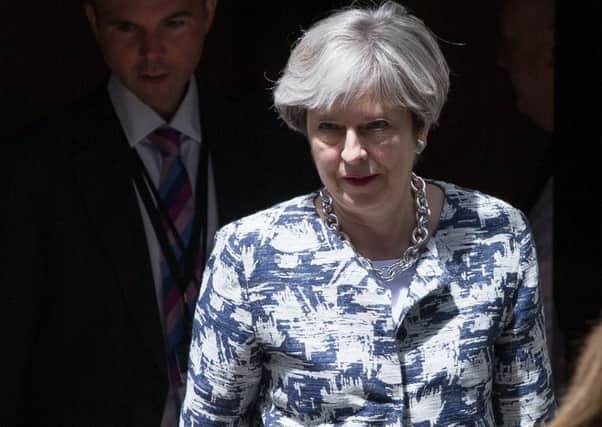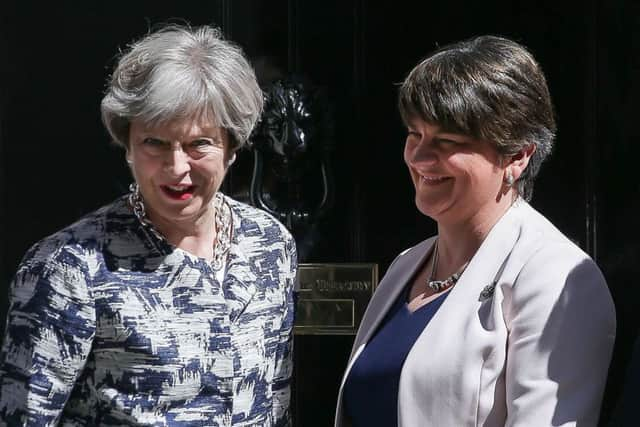How long will Theresa May stay in office?


But there are few heads of Government in recent times who have earned that moniker more than the Prime Minister Theresa May.
The Conservative leader might have just put pen to paper on a supply and demand deal with the Democratic Unionist Party (bunging £1bn to the Northern Ireland Executive in the process) but she is still not out of the woods.
Advertisement
Hide AdAdvertisement
Hide AdFor now, however, the Prime Minister is relatively secure in office, but it remains unlikely that she will fight another election as Tory party leader.


With Brexit talks taking place almost weekly, the Prime Minister would prefer more than the barely workable majority even her confidence-and-supply deal with the DUP gives her.
Leadership bids from colleagues, expected to dominate Westminster chatter after the election, seem to have been put on the backburner for now.
But with a Prime Minister with fortunes seemingly in terminal decline, we look at how and when she might leave office, or more likely, when she is forced out.
Turnaround?


Most, if not all, politicians crave power, and even the most modest of elected representatives more often than not aspire to bigger things and higher offices.
Theresa May has achieved the highest office in the land, and yet her grip on power has never been more tenuous.
A presidential style election campaign that put Mrs May front and centre and relegated her cabinet to supporting roles is considered one of the many reasons why the Tories lost their majority.
Mrs May’s defenestration has many even querying why she is still determined to hang on to power, whether motivated by a sense of duty in the national interest, or a belief that she can turn things around.
Advertisement
Hide AdAdvertisement
Hide AdShe may indeed believe the latter, but it is hard to envisage any circumstances in which it will come to pass.
The slightest rebellion will weaken her further, and the ongoing reversal of fortunes for Jeremy Corbyn could put Mrs May under more pressure.
Self-belief is important in politics, but those who believe the Prime Minister will be in power after another election may have taken faith to the point of delusion.
The short-term option
It is unlikely that the confidence and supply deal with the DUP will collapse – perhaps mainly because Arlene Foster’s party would never run the risk of allowing Jeremy Corbyn to take office.
It is possible, however, that grim poll ratings for the Tories, combined with any sign of faltering over the Brexit vision that Eurosceptic MPs believe in, could see the proverbial trigger pulled in a matter of months.
Formerly a pariah, Brexit Secretary David Davis is now being touted as a potential caretaker Prime Minister in the event that Mrs May is forced out sooner rather than later.
Brought in to steer the ship of negotiating with the remaining EU countries, Mr Davis would be expected to see that through and then stand aside ahead of a General Election.
Of course, that is just the theory – Prime Ministers are often hard to dislodge despite previous promising limits on their term – just ask Gordon Brown about that
Advertisement
Hide AdAdvertisement
Hide AdMrs May would rather leave later, of course, but like so much relating to her political fortunes, the Prime Minister’s fate is not wholly in her own hands.
Further down the road
Of course, even the most Machiavellian of Mrs May’s colleagues might realise that it could suit them to bide their time.
For one, no-one wants to be seen as the traitor who launches a broadside against their own leader, beleaguered though she may be.
With dire warnings over a potential economic squeeze relating to Brexit, many of Mrs May’s internal rivals would rather she is left to deal with that storm.
Should Britain emerge from it, a new leader would be able to, subtly of course, lay the blame at the door of their predecessor and attempt to right the ship.
If a new leader takes over after Britain has officially left the EU, it also means that the responsibility for any wrinkles in negotiations will be marked down as being a hangover from Mrs May’s legacy.
This is especially true if Mrs May is replaced by a Brexiteer, such as Boris Johnson, who can claim that they are better suited to the job of Prime Minister as a true believer, rather than a late convert like Mrs May, who voted Remain.
With challenges on all sides, Theresa May could hardly be blamed for seeking a quick exit – but with little chatter of an immediate leadership challenge, it could yet be a long road for a Prime Minister who gambled on an early election – and lost.
